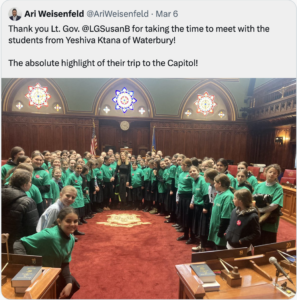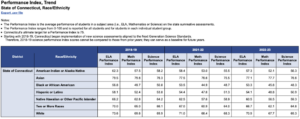In Connecticut, public schools are consistently failing to meet the needs of children from low-income families. Despite calls for help from parents and local communities, teacher unions continue to be a roadblock to progress for these students who are facing challenges within their current school system.
Teacher unions are resisting any alternatives to traditional public schooling, including options like charter schools and educational scholarships, even though such alternatives would not impact their financial resources.
The state’s two teacher unions, the Connecticut Education Association (CEA) and the American Federation of Teachers (AFT), have been reported to exert pressure on legislators with threats of repercussions for dissenting votes.
During the 2023 legislative session, an email to lawmakers by the two unions was made public. It warned that a vote in favor of a bill aimed at changing the charter school approval process would lead to a failing grade on the CEA’s “legislative report card” — an annual evaluation provided by the union, grading each legislator based on their voting record on specific bills.
Lawmakers failing to align with the unions’ objectives may jeopardize their backing during election season, which not only includes financial funding but also campaign support such as organizing get-out-the-vote efforts and door-to-door canvassing to secure the victory of their favored candidates.
Parent activists are growing increasingly frustrated with being overshadowed by teacher unions. During a Feb. 28 press conference at the Legislative Office Building, the Connecticut Parents Union (CTPU), an advocacy group focused on educational reform, joined forces with activists from Danbury and Middletown to urge lawmakers to fund and open charter schools in these cities.
The state Board of Education has already given approval to the schools in question, but the General Assembly has yet to allocate the required funds. Specifically, Danbury Prospect Charter School received approval in 2018, and Capital Preparatory (CPREP) in Middletown was greenlit in 2023.
Gwen Samuel, President of CTPU, kicked off the event — “Education Super Bowl” — clad in a football jersey bearing the number 1148, standing in front of goalposts which she later widened. According to Samuel, the number 1148 signifies the moment funding was pulled from the budget, just 12 minutes before the end of the 2023 legislative session. She also warned about the increasing obstacles Black and Latino students encounter because the legislature fails to provide the necessary funding.
The eleventh-hour decision led to the withdrawal of financial support for CPREP, which was on track to become Middletown’s inaugural charter school. The Appropriations Committee first designated $200,000 to CPREP for the 2024 school year in April 2023, followed by $4.75 million for the following year.
Janice Pawlak, president of the Middletown Federation of Teachers, in a statement to the CT Examiner, indicated that “the union believed the best action was to fully fund traditional public schools rather than send money to a charter school.”
Samuel continued, “Parents want access to safe, quality educational opportunities because regular traditional schools can’t meet their diverse needs.” She wants students to be able to have “college IDs over prison IDs.”
Danbury experienced a similar fate with funding not being allocated since its approval in 2018.
Melissa Asare, a representative from CTPU, said she was there to “demand action for the opening [of] two schools that are essential for our future and the future of our children.”
She highlighted statistics from the Connecticut Department of Education, noting that, “the average literacy rate in reading math and science for all students is around 50%. However, the reality for African American and Latino students is even bleaker.”
Asare stressed that such disparities underline the inadequacy of the public school system in meeting the needs of every student.
Rep. Rachel Chaleski (R-Danbury) said the goal is to “improve student outcomes and we must remember that this is all about kids, to move the needle of academic success and to make a difference in the lives of children.
In February, Rep. Chaleski introduced a bill aiming to secure funding for the Danbury Charter School. It has yet to be scheduled for a public hearing.
It is worth noting that most teachers in charter schools are not affiliated with unions. Consequently, when students move from traditional public schools to charter schools, unions see a decrease in membership, which translates to lower dues: money that can be redirected to legislators who share their views. This can explain the motivations behind some lawmakers’ positions on charter schools.
The resistance from unions extends beyond charter schools. They have expressed strong opposition to a proposed bill that would offer a tax credit for donations made to nonprofit organizations that grant scholarships to low-income families to attend private schools. This opposition highlights the union’s broader stance against educational alternatives even if it is in the best interest of the child.
During the March 6 public hearing for the bill, Carolanne Marquis, CEO of the Connecticut Center for Educational Excellence (CTCEE), said tax-credit scholarships are a “way for children to achieve their dreams and goals. which were previously severely challenged by the obstacles of poverty, opportunity and lack of education within the family. Opportunity scholarships give parents the hand up.”
Marquis stated that after CTEEE’ s launch, she received over 700 income-qualified applications from 78 municipalities within the first three months.
She went on to share a story of a Bridgeport mother seeking help for her fourth-grade daughter, who was deeply affected by a family tragedy.
“The daughter began withdrawing quickly and became a target at school being severely bullied” Marquis recounted, noting that the girl had “run away from her fourth-grade class on four occasions in two weeks.”
The girl was eventually awarded a scholarship to a private school and is now a high school senior, having received acceptance letters and scholarship offers from six colleges.
Marquis concluded her statement by asking lawmakers to support the bill emphasizing the potential to significantly help families by providing them with educational choices that best suit their individual needs.
On the other side of the issue was New Haven teacher and divisional vice president of the AFT Connecticut, Leslie Blatteau, who testified against the bill.
In her testimony, Blatteau chose to leave her teacher’s hat at home by not focusing on the academic challenges students have been facing, nor on their recovery process from setbacks experienced before the pandemic.
According to the latest figures from the Connecticut State Department of Education (CTDOE) students in her district have not reached the levels of proficiency in math, English language arts and science seen before the pandemic (2018-2019).
Instead, Blatteau shifted the discussion towards conspiracy theories, labeling the bill as an effort to “further divest from and privatize our public schools, which are a cornerstone of our democracy.” Wanting “be real here,” Blatteau suggested that supporters of the bill included entities such as the American Federation for Children, the Koch brothers, the American Legislative Exchange Council, and Betsy DeVos, former Secretary of Education under President Donald Trump.
However, it’s important to point out that of the mentioned groups, only the American Federation for Children actually testified. The majority who did testify supported tax-credit scholarships, and were primarily comprised of concerned parents, educational experts, and a group of students from the Yeshiva K’tana school in Waterbury.
Also against the bill was another union boss John O’Connor, an Associate Professor and officer for the faculty union CSU-AAUP. His solution to the achievement gap is that “public schools need more funding” and that “plans like this only divert public dollars to privately run institutions.”
However, according to the most recent data from the U.S. Census Bureau, Connecticut’s 2021 per-pupil spending is the fourth highest in the country spending at $22,769, bested by Vermont ($23,586), District of Columbia ($24,535) and New York ($26,571). The national average per student is $14,347.
Educational spending in Connecticut has been on an upward trajectory annually rising from $20,635 per student in 2018 to $21,310 in 2019 and further to $21,346 in 2020. Despite these increasing investments per student, academic proficiency continues to show a downward trend.
CTDOE reports that students across the state, regardless of race, did not reach the levels of proficiency in math, English language arts and science seen before the pandemic (2018-19). An outlier to the trend is the performance of Asian students who have shown a slight improvement in science.
Rep. Holly Cheeseman (R-East Lyme) pointed out to O’Connor that the state “currently supplies $4.5 billion in funding to our schools” and if the bill were to pass the tax credit would be “[.0005] of the current amount we’ve currently sent to our public schools.”
Yet teacher unions, like CEA, continued pushing for increased funding, including a proposal for a $60,000 minimum starting salary for teachers and a $1,000 COVID-19 acknowledgment bonus. Meanwhile, parents are desperately looking for options for their kids only to find their dreams crushed by the unions.
Lawmakers and unions need to realize two things can happen at once: funding for public schools can be maintained while also allocating resources for charter schools and opportunity scholarships. This approach would allow lawmakers to support their friends in the unions and help students facing challenges, thereby creating a more equitable and inclusive education system that benefits all parties involved.
Click HERE to read Yankee’s policy paper on the Connecticut K-8 Educational Achievement Gap.
Click HERE To Learn more about CTCEE and tax-credit scholarships
This Week on Yankee’s Podcast Y CT Matters
The Connecticut Center for Educational Excellence (CTCEE), a Yankee Institute project, launched just over a year ago, providing scholarships to low-income students and families across Connecticut. Carolanne Marquis, the CEO of CTCEE, shares how 900-plus families have applied for such scholarships, and how students have already benefited emotionally and scholastically in less than a year at their new schools. She also advocates for an active bill before the Finance Committee that would create a state level tax-credit scholarship program. This program would incentivize greater support for scholarships that help the students and families who need it most.
Click HERE to listen
Will I See You at Yankee’s Capitol Insiders Breakfast?
One month into the legislative session, YI is making headway on many crucial pieces of legislation!
Don’t just take our word for it — come join us at this year’s “Capitol Insiders’ Breakfast” and get the inside scoop on what’s happening in both chambers in Hartford!
Our panelists will be discussing the legislation that can offer increased opportunity and prosperity for our state, as well as what we need to do to keep state unions, big government special interests and Hartford’s elite on the run.
We look forward to you joining us and our panel:
- Andy Markowski – Principal, Statehouse Partners, LLC
- Bryce Chinault – Director, External Affairs, Yankee Institute
- David Flemming – Director of Policy, Yankee Institute
- This is also a great chance to catch up with fellow YI friends!
Click HERE to reserve your seat




